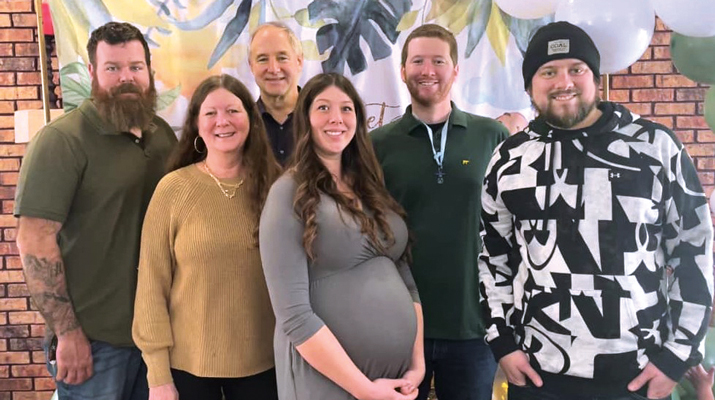LP Gas Hall of Fame profile: Bruce Swiecicki
The 2024 LP Gas Hall of Fame dinner and induction ceremony will take place April 4 at The Westin Charlotte in downtown Charlotte, North Carolina. This year’s inductees are Joe and Rosie Buschur (McMahan’s Bottle Gas), Randy Doyle (MAPCO/Thermogas), Bruce Swiecicki (National Propane Gas Association) and Mike Walters (Superior Energy Systems). Visit the LP Gas Hall of Fame website.
Bruce Swiecicki just wanted to play baseball.
As a young child and high schooler in the Chicago area, he was a pitcher and infielder, and he took the sport seriously. It was his only career ambition.
After high school, Swiecicki forewent college and dabbled in different trades. He pumped gas, drove cement trucks and labored at construction companies. He even tried selling vacuum cleaners and household appliances, but he wasn’t much of a people person, so he gave that up quickly.
Then, while still in his 20s, Swiecicki experienced a revelation that would one day benefit the entire propane industry.
“I realized I didn’t want to be in a ditch for much longer than I was already,” Swiecicki says.
Swiecicki metamorphosized. He enrolled in college and, knowing that he excelled in math and science, earned undergraduate and graduate degrees in engineering. As a young professional, he discovered a latent talent for writing, and he turned into a people person, somewhat out of career necessity.
In 1993, Swiecicki landed a job at the National Propane Gas Association (NPGA), where he has worked ever since. Today, he is the vice president and chief technical officer of regulatory and technical services. In that role, he helps write and edit model propane codes adopted by state and municipal governments across the U.S.
Over the past 30 years, Swiecicki and his team have updated the codes to include the latest technology and to make the use of propane safer for the industry and the environment.
In addition, Swiecicki, representing NPGA, participates in more than 30 national and international code development and standard-setting committees, including those with the National Fire Protection Association (NFPA), the International Codes Council and the American Society of Heating, Refrigeration and Air-Conditioning Engineers.
For his lifelong work in the propane industry, Swiecicki will be inducted into the LP Gas Hall of Fame during an April 4 ceremony in Charlotte, North Carolina.
“Bruce brings several unique attributes to industry issues,” Robert Freeman, special projects administrator at Superior Plus Energy Services, says in his nomination letter. “First is a strong work ethic, coupled with concise and clear writing skills.
“Much of the code text that we use today in our industry was written by Bruce, often typed in a meeting room where industry peers surround him, the words flashing up on a screen in front of fellow attendees,” Freeman says.
Freeman praised Swiecicki for his candor, honesty and integrity in an industry that is largely self-regulated, with codes created by people with a vested interest in them. These attributes, Freeman says, have earned Swiecicki respect inside and outside the industry.
“Bruce quickly gained a reputation as being fair and unbiased, interested in advancing safety above other considerations, and not simply being an industry mouthpiece,” Freeman says. “This has enabled him to work successfully ‘across the aisle’ with varied groups and interests, and drive consensus-based change for propane.”
A new start
Swiecicki was 27 and 35, respectively, when he earned bachelor’s and master’s degrees in mechanical engineering at the University of Illinois. He envisioned himself as an engineer designing new products.
However, his first job after college was at Building Officials and Code Administrators International (BOCA), which created, maintained and edited model construction codes. That group eventually merged with two other organizations to form the International Code Council.
In his previous work life, Swiecicki didn’t interact much with people and never cared for it. He certainly didn’t write. At BOCA, he was challenged on both fronts because his job was to write and rewrite construction codes, a skill he didn’t know he had. He was also sent on the road to teach code to others.
“At BOCA, the thought of even talking to people on the phone was scary to me, but I got over that in a hurry,” Swiecicki says. “I became more accustomed to and more comfortable with that sort of environment. I was able to adjust. I became a people person.”
Swiecicki’s experience at BOCA also built up his confidence.
“I had to do seminars for my bosses first before I went out on the road and taught others,” Swiecicki says. “One of the things they instilled in me was that I had to know the material more than the people I instructed, because code was only part of their job, but it was my specialty.”
Swiecicki applied for the NPGA job after noticing a want ad in the Chicago Tribune. The organization preferred a candidate with a propane background, which Swiecicki lacked. However, at BOCA, he had gained plenty of experience working with codes and standards and had honed his writing and verbal communication skills, so he was hired.
At NPGA, Swiecicki’s job was to lead volunteer members of the organization’s Technology, Standards and Safety Committee, charged with developing and refining NFPA 58, the LP gas code. The objectives of the committee – consisting of propane manufacturers, retailers, insurance agents and appliance and equipment distributors – included clarifying code language so industry professionals could understand it.
“I became pretty good at it, even though it was something I never envisioned for myself,” Swiecicki says.
Swiecicki had to guide the committee to consensus for every code amendment and addition.
“It’s not always easy to get that consensus,” he says. “Sometimes the committee can’t agree. It does take time. I’m there to administer the committee so it can determine what the members want to do. My role is to facilitate that discussion and do what is best for the industry.”
Adapting to change
Swiecicki’s job title at NPGA has changed over the years, but his main responsibility – writing and amending model propane codes – has remained mostly the same.
Swiecicki helped with the 1995 NFPA code adoption of a two-stage regulation for vapor distribution systems. The two regulators together ensure that propane gas and vapor pressures do not reach dangerously high levels when moving from tank to pipes in a building.
“Overpressuring could result in the release of gas and fire or explosion if the gas finds a source of ignition,” Swiecicki says.
In 1998, Swiecicki and his team established a requirement for an overfill prevention device that has nearly eliminated the overfilling of portable propane cylinders. In 2001, he assisted in the writing of new code calling for valves inside propane storage containers. The valve can be closed remotely in an emergency and can even stop the flow of propane automatically in case of fire.
Swiecicki helped introduce self-service autogas refueling to the International Fire Code of 2015. This allows propane users to fill their own vehicles, thanks to the new K15 dispenser nozzle that won’t let propane flow unless there is a proper, safe connection.
“We’re hoping that will really assist in creating more widespread use of propane as an alternative vehicle fuel for the general public,” Swiecicki says.
Swiecicki also has represented NPGA by working with regulatory bodies and advocating for the industry. For example, in 2001, the U.S. EPA wanted the industry to comply with its risk management program, which would have severely restricted the installation of propane bulk plants and hurt retail operations. Swiecicki and the NPGA proposed a compromise that the EPA accepted.
“We don’t want to go overboard with regulatory requirements,” he says. “We try to strike a fair balance that provides for safe use, transportation and storage of propane but still allows us to do business and be a service to the community by providing heat during cold days.”
Swiecicki’s work continues. Right now, as a voting member of NFPA’s Fire Protection of Cannabis Growing and Processing Facilities Committee, he’s assisting in the creation of a new code section. It addresses the use of propane to heat cannabis processing facilities and extract cannabinoids and oils needed for cannabis products.
Meanwhile, Swiecicki is educating the public that propane is an environmentally safe fuel that, unlike gasoline, is not toxic to groundwater.
“We advocate for propane as clean fuel, even in modern-day terms,” Swiecicki says. “We’re fighting to keep propane viable within the electrification movement. We point out that, compared to natural gas or coal, propane is cleaner as a source energy in the generation of electricity.”
Swiecicki, 67, still lives in the Chicago area, in Tinley Park, Illinois, with his wife, Karen. Their children are Jordan, 34; Megan, 32; and Ryan, 27. He says he’s grateful for the opportunity to work at NPGA, adding that his co-workers have made his job enjoyable.


















